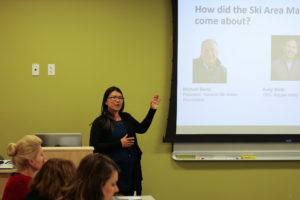Colorado State University recently hosted an international delegation of 19 ski area managers from Eastern European and Central Asian countries. The group came to CSU to tap into expertise in industry management and marketing best practices from ski area management expert Natalie Ooi, assistant professor and program coordinator of the Graduate Certificate in Ski Area Management in the Department of Human Dimensions of Natural Resources.

The delegates, members of an internship program led by the U.S. Department of Commerce’s Special American Business Internship Training, were exposed to North American ski industry innovations that they could apply in their home countries.
“We need more experience in how ski areas operate; both on the technical side: snow making, grooming, etc., and at the same time the management side: marketing, packaging, and educating as well,” said Kairat Sadvakassov of the Kazakhstani winter tourism investment firm Kaznex Invest, who participated in the program. The director for the Ukranian ski area POLTAVA SKI, Anton Faltynskyy, agreed that the time at CSU had been useful. “I am hoping that we will find a collaborative connection between Colorado State University and our universities in the Ukraine.”
Graduate certificate with industry connections
CSU’s Graduate Certificate in Ski Area Management, the only program of its kind in North America, was developed in close coordination with industry leaders, including the National Ski Areas Association, which facilitated the international group’s visit. The graduate certificate serves the industry through educating a new generation of middle to senior level ski area managers.
“The content provided in the Graduate Certificate in Ski Area Management is undoubtedly of great benefit to the SABIT delegation as a part of their Winter Tourism program, especially considering the curriculum was developed in collaboration with a range of ski area managers across North America,” explained Michael Berry, president of the NSAA.
Participants learned how the program imputes ski area management acumen, with the flexibility to be completed while working through CSU Online’s distance learning platform. Sadvakassov and Faltynskyy both mentioned that they hoped their national universities could collaborate with CSU on a possible partnership, as did Elena Koveleva, CEO of Demac Lenko, who said the program could be extremely useful in Russia.
Sadvakassov pointed out that out of the 50 universities and 20 ski areas in Kazakhstan there are no ski area management programs. Julia Arievitch, chief development officer of the Russian winter tourism development group, KAHT, noted that she has a number of employees she wants to encourage to participate in the graduate certificate because of a lack of well-educated people in the industry in Russia, “The industry is still small and people do not have any chance to receive education like this in our country,” she said.
Winter sports tourism economic impacts
The ski industry is a major economic contributor around the world, particularly within rural communities. In the U.S., the winter sports industry is a $7.1 billion industry that has averaged a total of 57.5 million skier days since 2003. Worldwide, there are more than 400 million skier days per year. With these trends continuing globally, Ooi has positioned CSU as an innovator in ski area management education.
 “Through partnerships with the NSAA and ski areas across the country, we’ve created a unique program that draws on the expertise of ski industry professionals and packages that knowledge into an accessible, online platform,” said Ooi. “We expose students to wide-ranging perspectives and innovative ideas from across the industry, including the latest management and marketing information systems, novel sustainability initiatives, and human resources management practices.”
“Through partnerships with the NSAA and ski areas across the country, we’ve created a unique program that draws on the expertise of ski industry professionals and packages that knowledge into an accessible, online platform,” said Ooi. “We expose students to wide-ranging perspectives and innovative ideas from across the industry, including the latest management and marketing information systems, novel sustainability initiatives, and human resources management practices.”
SABIT’s importance for U.S. Eurasian partnerships
Established in 1990 by the U.S. Department of Commerce, the SABIT program provides technical assistance and builds partnerships by training Eurasian business leaders in U.S. business practices. These training programs directly support Eurasian economic and civil society development by encouraging market-based reforms, while generating valuable export and investment opportunities for U.S. industry. SABIT helps American organizations create new relationships and strengthen existing ties with Eurasian partners and customers.
SABIT’s Winter Tourism program provides visiting delegates with a comprehensive understanding of the winter tourism industry in the U.S. During the course of the three-week program, the participants met with industry associations, universities and colleges, skiing and snowboarding resorts, resort management companies, federal, state, and local government agencies, equipment manufacturers and other related organizations. Participants in this group came from the Eastern European and Central Asian countries of Kazakhstan, Kyrgyzstan, Russia, Ukraine and Tajikistan.
Become a ski area management expert
The Graduate Certificate in Ski Area Management is a flexible and affordable 12-credit program of study delivered by CSU Online in the form of 6 eight-week accelerated courses over the Fall and Spring semesters. It can be completed within two semesters, while also working full-time, or on a course by course basis. Fall applications will be accepted up until July 15, 2016.
For more information about the program, visit http://www.online.colostate.edu/certificates/ski-area-management/